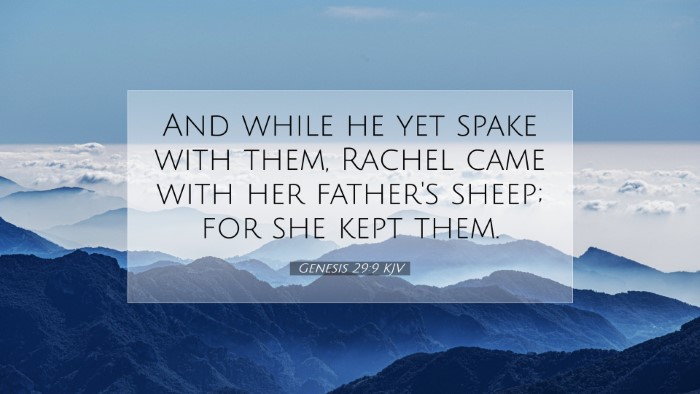Commentary on Genesis 29:9
Verse: "While he yet spake with them, Rachel came with her father's sheep: for she kept them."
Introduction
This verse introduces the arrival of Rachel, a significant figure in the narrative of Jacob's life. The setting, the well, is crucial as it signifies the intersection of Jacob's journey and the providential unfolding of God's plan. This commentary draws insights from public domain sources, including Matthew Henry, Albert Barnes, and Adam Clarke, to provide a rich theological framework.
Contextual Background
Genesis 29 marks a pivotal moment in Jacob's life as he leaves his family in Canaan and journeys to Haran. He seeks to find a wife from his mother's family, following Isaac's instructions. This journey is laden with themes of divine guidance, human desire, and the unfolding of God's covenantal promises. Jacob's encounter with Rachel is not merely a coincidence but a divinely orchestrated event.
Analysis of Key Themes
-
Divine Providence
As Jacob arrives at the well, it is significant that Rachel appears shortly after he meets the shepherds. Albert Barnes notes that the timing illustrates God's hand in guiding Jacob to his destiny. This theme of divine providence is woven throughout Genesis, underscoring the notion that God is actively involved in the affairs of humanity.
-
Character of Rachel
Rachel is presented as a strong, resourceful woman—she is both a shepherdess and the daughter of Laban. Henry highlights her beauty and grace, which later captivate Jacob. Her role as a keeper of her father's sheep reflects the responsibilities women held in agrarian societies. Rachel's presence marks the beginning of a complex relationship that will have lasting consequences in the narrative.
-
Importance of the Well
The well functions as a symbolic location for revelation and encounter. Adam Clarke emphasizes that many significant events in the Bible occur at wells, making them places of divine meetings and covenant affirmations. Here, at the well, Jacob's destiny will shift as he meets Rachel.
-
The Role of Shepherding
Shepherding is a recurring motif throughout the scriptures, symbolizing care, guidance, and stewardship. Rachel tending to her father's sheep symbolizes the pastoral care God extends to His people. This connection between shepherd and sheep mirrors the relational dynamic God desires with humanity.
Theological Implications
Rachel's arrival serves as a catalyst for Jacob's transformation and the establishment of the twelve tribes of Israel. The encounter underlines the theme of chosen lineage and God's commitment to His covenant people. Each character's actions contribute to the unfolding redemptive history which culminates in Jesus Christ, the ultimate Shepherd.
God's Guidance in Romantic Relations
This verse invites reflection on God's role in human relationships. Jacob's attraction to Rachel can be viewed as part of God's plan to establish His people. Spiritual leaders and students alike must recognize the importance of seeking God's will in relationships, mirroring Jacob's journey that led him to the right partner.
Lessons for Contemporary Readers
There are several lessons to be drawn from Genesis 29:9 that remain relevant for today's readers:
- Trust in God's Timing: Just as Jacob's encounter with Rachel was timely, believers should trust in God's perfect timing in their lives.
- Seek Divine Guidance: The importance of prayer and dependence on God's guidance is emphasized in personal and relational decisions.
- Embrace Roles and Responsibilities: Rachel’s example shows the value of fulfilling responsibilities with grace and strength, which offers encouragement to both men and women today.
- Cultivate Relationships: As seen in this passage, building meaningful relationships should be based on shared faith and commitment.
Conclusion
Genesis 29:9 encapsulates a moment that is rich with narrative and theological significance. The arrival of Rachel signifies more than the beginning of Jacob's love story; it is a part of the larger tapestry of God's redemptive work through His chosen people. Insights from the various commentators deepen our understanding, enabling pastors, scholars, and theologically inclined readers to appreciate the profound implications of this encounter.


